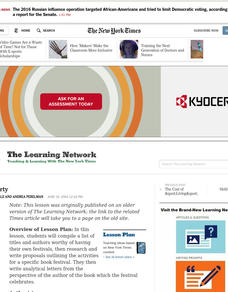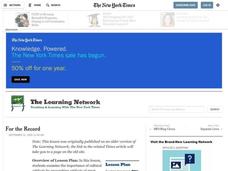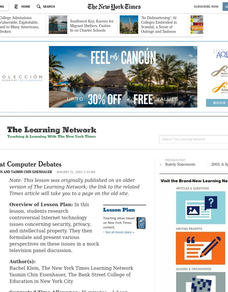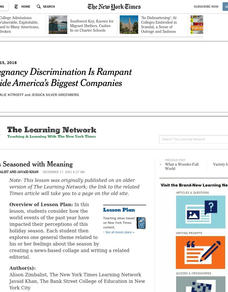Curated OER
Black Power
Use this New York Times lesson plan to research contemporary leaders in the African-American community. After reading the article "Blacks Weigh the Impact of the Post-Jackson Years," middle and high schoolers discuss the varying...
Curated OER
Book Party
Students compile a list of titles and authors worthy of having their own festivals, then research and write proposals outlining the activities for a specific book festival. They write analytical letters from the perspective of the author...
Curated OER
How Cultures Differ - Two Different Perspectives on the Same Even
Students explore the effects of culture through the story Running by Peter Hessler. In this geography and cultural lesson, students act as newspaper reporters covering the story of the race. Students write newspaper articles as reporters...
Curated OER
A Sea-nic Perspective
Students brainstorm topics related to the health of our world's oceans. They create presentations about specific issues affecting oceans for display in a classroom exhibit. They write letters of invitation to guests to view the exhibit.
Curated OER
Comic Book Characters
Explore gender stereotypes by analyzing how male and female characters are depicted in comic books. Using the provided Comic Book Analysis sheet, students record the attributes of male and female comic book characters. Then the whole...
Curated OER
THE BACKWARD DESIGN PROCESS
Learners explain the practical uses of robots. They interpret possible careers in robotics, apply the safety guidelines of robots, and develop a perspective of the use of robots. They empathize with the cultural issues of robots in work...
Curated OER
Charles Darwin Meets John Paul II
If you teach AP English language and composition and are looking for a way to address the differences between written and spoken arguments, consider this lesson. Over the course of three days, class members research Charles Darwin or...
Curated OER
Scientific Scenes
Students discover how the public's perceptions of science have changed throughout recent history; then research scientific and technological breakthroughs in a variety of areas. They then create plays that allow scientists to encounter...
Curated OER
Proper Perspective
Young scholars consider what makes a famous painting realistic, then examine a theoretical debate about how Renaissance masters created their true-to-life images. They create their own realistic drawings.
Curated OER
Poll-icy Perceptions
Young scholars create their own opinion polls about local policy issues. They evaluate how anonymity may affect responses. In groups, students experience the process of developing polls, focusing on student-related topics. Young scholars...
Curated OER
Rediscovering Forgotten Women Writers
Women's voices are becoming more prominent in the world of literature, but for centuries, this wasn't the case. Young historians research a woman whose writings are considered to be lost, out of print, or forgotten. They develop an oral...
Curated OER
For the Record
Learners read a New York Times article in order to examine the importance of cultural artifacts. They create essays from the point of view of one cultural artifact to demonstrate the knowledge they gained by doing research.
Curated OER
As the Kids Come and Go: Mapping a Classroom
Map the classroom with your kids to help them understand how maps work and how to read them. The lesson starts off with a story about animals living and moving around the globe, and then kids create maps of their classroom to show how...
Curated OER
Using History to Teach Tolerance: A Ripple of Hope
Students investigate the prejudice and racism that has existed in the U.S. for centuries by attending a field trip. In this equality lesson, students visit the Tolerance Museum and discuss the history of the U.S. Students...
Curated OER
The Object Is Objectivity
Students search for and read articles about the initial United States strike on Afghanistan from non-U.S. news sources, then describe the journalists' perspectives and reflect on how difficult it might be to maintain an objective wartime...
Curated OER
Popularity, Publicity, and Public Service
Students discuss the issue of celebritites who speak out for certain diseases. After reading an article, they consider a doctor's perspective on the use of celebrities. In groups, they research a common disease and design a public...
Curated OER
If I Could Talk Like the Animals. . .
Students read and discuss a film review of the animated movie Antz and then write a monologue from the perspective of a non-human organism.
Curated OER
A Bug's Journey
Students research the art of John Baldessari. In this art history lesson, students examine Baldessari's drawing of a beetle and discuss the characteristics of these bugs. They write a story from a bug's perspective and create their own...
Curated OER
Does a Picture Always Say a Thousand Words?
Students read and discuss "Enigmatic Portraits of Teen-Agers Free of All Context," then choose a photograph and write a first-person narrative from the perspective of the subject.
Curated OER
Through the Eyes of a Child
Students explore how documentaries can present realistic and sometimes difficult perspectives on events in our world. They choose current issues that interest them and create their own documentaries.
Curated OER
The Great Computer Debates
Students research controversial Internet technology issues concerning security, privacy, and intellectual property. They formulate and present various perspectives on these issues in a mock television panel discussion.
Curated OER
How Does Ancestry Affect Folklore?
Students break into groups of 4 or 5 and choose an option to demonstrate a different cultural perspective in a fairy tale or other folklore that they are familiar. Possible choices are: PowerPoint presentation, video, digital...
Curated OER
What's So Nice About Fairy Tales?
Seventh graders modernize a fairy tale, then compare their version with he original version and determine whether or not they've changed the author's original intent.
Curated OER
Holidays Seasoned with Meaning
Students consider how the world events of the past year have impacted their perceptions of this holiday season. Each student then explores one general theme related to his or her feelings about the season by creating a news-based collage...























